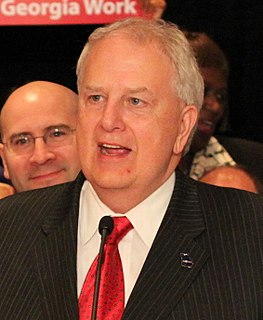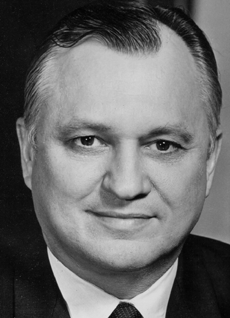Elections in Georgia are held to fill various state and federal seats. Georgia regular elections are held every even year. The positions being decided each year varies, as the terms of office varies. Special elections are held to fill vacated offices. Georgia is one of seven states that require a run-off election if no candidate receives a majority of the vote in a primary election. Uniquely, Georgia requires a run-off election if no candidates wins a majority of the vote in a general election; only Louisiana has a similar requirement, but it operates under a different election system.

The 2006 Georgia gubernatorial election was held on November 7, 2006. Incumbent Republican Governor Sonny Perdue ran for re-election to a second and final term as governor. Governor Perdue was renominated by the Republican Party, defeating a minor opponent in the process, while Lieutenant Governor Mark Taylor narrowly emerged victorious from a competitive Democratic primary. In the general election, though Taylor ran a spirited campaign, Perdue was aided by the increasing tendency of the state to vote for Republicans and by his popularity with the public; polling showed his approval ratings above sixty percent. In the end, Perdue was overwhelmingly re-elected as governor, defeating Taylor in a landslide.

The 1998 South Carolina gubernatorial election was held on November 3, 1998 to select the governor of the state of South Carolina. Jim Hodges, the Democratic nominee, handily defeated Republican Governor David Beasley to become the 114th governor of South Carolina. Beasley was the first incumbent governor to be defeated for reelection since Daniel Henry Chamberlain in the disputed election of 1876. As of 2019, this is the most recent election in which a Democrat was elected Governor of South Carolina.
The Democratic Party of Georgia is the affiliate of the Democratic Party in the U.S. state of Georgia. It is one of the two major political parties in the state. It is chaired by Nikema Williams.

The 1990 Alabama gubernatorial election was held on 6 November 1990 to select the governor of the state of Alabama. The election saw incumbent Republican governor Guy Hunt defeat Democrat Paul Hubbert, executive secretary of the Alabama Education Association.

The 2010 Georgia gubernatorial election was held on November 2, 2010. Incumbent Republican Governor Sonny Perdue was term-limited and unable to seek re-election. Primary elections for the Republican and Democratic parties took place on July 20, with a Republican runoff on August 10. The Libertarian Party also had ballot access and nominated John Monds. On November 2, 2010, Barnes conceded to Nathan Deal. He took office on January 10, 2011.

The 1970 Georgia gubernatorial election was held on November 3, 1970. It was marked by the election as Governor of Georgia of the relatively little-known former state Senator Jimmy Carter after a hard battle in the Democratic primary. This election is notable because Carter, often regarded as one of the New South Governors, later ran for President in 1976 on his gubernatorial record and won.

The 2002 Georgia gubernatorial election was held on November 5, 2002. Incumbent Democratic Governor Roy Barnes sought re-election to a second term as governor. State Senator Sonny Perdue emerged as the Republican nominee from a crowded and hotly contested primary, and he faced off against Barnes, who had faced no opponents in his primary election, in the general election. Though Barnes had been nicknamed "King Roy" due to his unique ability to get his legislative priorities passed, he faced a backlash among Georgia voters due to his proposal to change the state flag. Ultimately, Perdue was able to defeat incumbent Governor Barnes and became the first Republican to serve as governor of the state since Reconstruction.

The 1990 Vermont gubernatorial election took place on November 6, 1990. Incumbent Democrat Madeleine M. Kunin did not seek re-election. Former Governor of Vermont, Republican Richard Snelling defeated Democratic State Senator Peter Welch in the general election.

The 1990 Alaska gubernatorial election took place on November 6, 1990, for the open seat of Governor of Alaska. In 1989, incumbent Governor Steve Cowper, a Democrat, had announced that he would not seek re-election for a second term.

The 1998 Georgia gubernatorial election was held on November 3, 1998. Incumbent Democratic Governor Zell Miller was unable to seek re-election due to term limits, therefore creating an open seat. To replace him, State Representative Roy Barnes won the Democratic Party's nomination after a close and highly contested primary election, while businessman Guy Millner, who had run for Governor and the United States Senate in the previous four years, won the nomination of the Republican Party. In the general election, Barnes was able to defeat Millner by a margin of victory larger than Governor Miller's victory over Millner four years prior, which was in part due to the unpopularity and controversy of Mitch Skandalakis, the Republican nominee for Lieutenant Governor of Georgia. As of 2018, this is the most recent election in which a Democrat was elected Governor of Georgia.

The 1994 Georgia gubernatorial election occurred on November 8, 1994, to elect the next Governor of Georgia from 1995 to 1999. Incumbent Democratic Governor Zell Miller, first elected in 1990, ran for a second term. In his party's primary, Miller received three challengers, but easily prevailed with just over 70% of the vote. The contest for the Republican nomination, however, was a competitive race. As no candidate received a majority of the vote, John Knox and Guy Millner advanced to a run-off election. Millner was victorious and received the Republican nomination after garnering 59.41% of the vote.

The 2014 Georgia gubernatorial election took place on November 4, 2014, to elect the Governor of Georgia, concurrently with the election to Georgia's Class II U.S. Senate seat, as well as other elections to the United States Senate in other states and elections to the United States House of Representatives and various state and local elections.

The 1962 Georgia gubernatorial election was held on November 6, 1962. This election was notable for a number of reasons: First, it was the last gubernatorial election in Georgia to date where the Republican Party did not field a candidate. Second, the primary election was the first that took place under a winner-take-all system, as the previously used County Unit System had been struck down by the US Supreme Court in Gray v. Sanders. Finally, upon election, Carl Sanders became the youngest governor of a state at the time and the first governor from an urban area since the 1920s.
The 1948 Georgia gubernatorial special election was held on November 2, 1948. The election was held as ordered by the Supreme Court of Georgia's decision in 1947 declaring Melvin E. Thompson governor in the wake of The Three Governors Controversy. Herman Talmadge, the son of the winner of the 1946 election, the late Eugene Talmadge, defeated Governor Thompson in the Democratic primary by a margin of 51.8% to 45.1% with three other candidates getting 3.1% of the vote and then proceeded to win the general election with 97.51% of the vote.

The 1982 Georgia gubernatorial election was held on November 2, 1982. Joe Frank Harris was elected as the 78th Governor of Georgia.

The 1990 gubernatorial election in Wisconsin was held on November 6, 1990. Incumbent Republican governor Tommy Thompson won the election with 58% of the vote, winning a second term as Governor of Wisconsin.

The Wyoming gubernatorial election of 1990 took place on November 6, 1990. Incumbent Democrat Mike Sullivan ran for re-election as Governor of Wyoming. Sullivan defeated Republican businesswoman Mary Mead.
United States gubernatorial elections were held in 1914, in 31 states, concurrent with the House and Senate elections, on November 3, 1914.




















